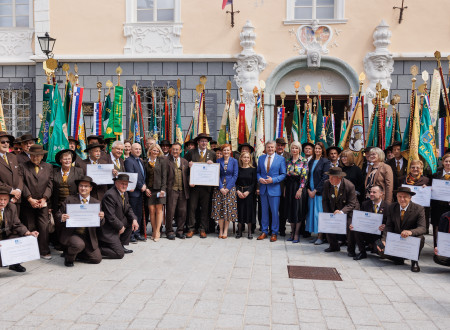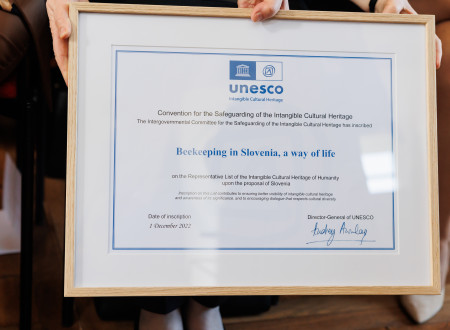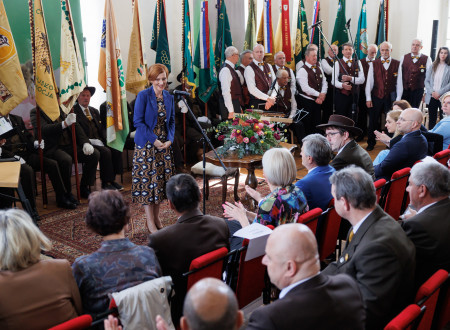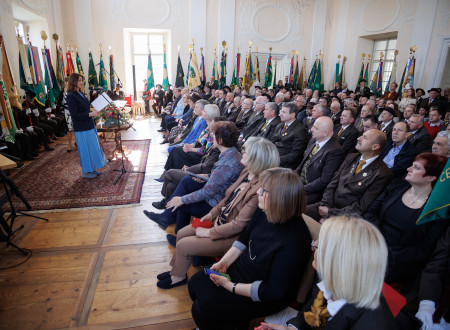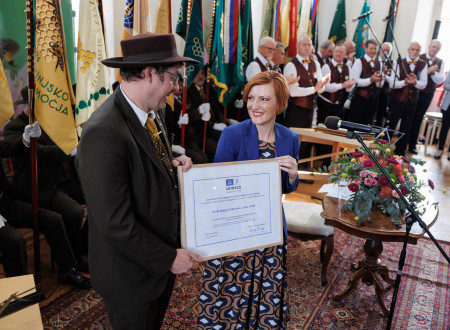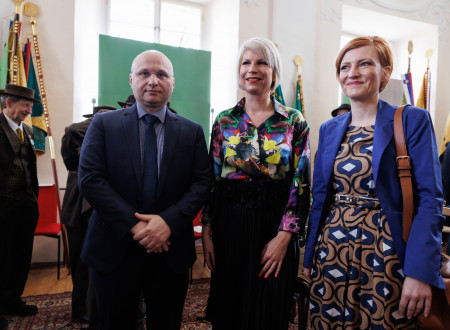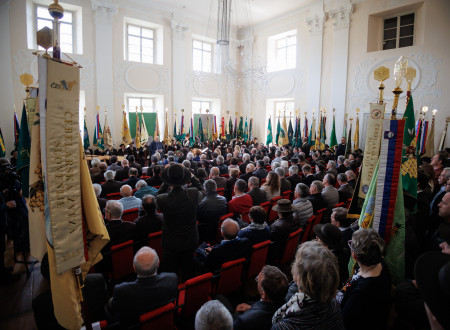Beekeeping on the Representative List of Intangible Cultural Heritage
Beekeeping has thus become part of a rich and diverse intangible cultural heritage, uniting countries from across the world in respect for the achievements of past generations and inspiring the creativity of modern expressions and social practices. The recognition of the United Nations Educational, Scientific and Cultural Organisation is also a thank you to all beekeepers preserving the tradition with their way of life, passing their knowledge and skills from generation to generation and maintaining the sensitive ecological balance and sustainable development through their love of nature and bees.
The guests were addressed by Dr Kozma Ahačič, Head of the Fran Ramovš Institute of the Slovenian Language at the Research Centre of the Slovenian Academy of Sciences and Arts, and heard about the importance of beekeeping for Slovenian culture from Dr Petra Bole, Director of the Radovljica Municipality Museums, and Špela Spanžel, Director-General of the Cultural Heritage Directorate, who presented the international context behind the recognition of the beekeeping heritage. The cultural programme featured the Male Chamber Choir of the Slovenian Beekeepers’ Association, the pupils of the Radovljica Music School and banner carriers of beekeeping societies. The event was organised by the Radovljica Municipality Museums and the Slovenian Beekeepers’ Association in collaboration with the Ministry of Culture.
Beekeeping as part of intangible cultural heritage
In Slovenia, beekeeping is a way of life for many individuals, families and communities that harvest bee products for food and traditional medicine and use their knowledge and skills to care for bees and the environment. The only subspecies in Slovenia is the Carniolan grey bee. Beekeepers tend approximately 200,000 bee colonies and, through controlled queen breeding, ensure the responsible preservation of the bee’s valued characteristics: fertility, excellent orientation and resistance to weather conditions. Bees are bred mostly in wooden apiaries in the vicinity of beekeepers’ homes. Communities show a loving and respectful attitude to bees, and the associated knowledge, skills and practices have developed through a hundred-year tradition passed down from generation to generation. Beekeepers, who consider bees their teachers, friends and bearers of the symbolic virtues of cleverness and economy, expand their knowledge and skills through constant exploration. The importance of beekeeping in Slovenia is reflected in its rich terminology, as well as in academic, literary and folklore texts (printed material recorded from the 18th century onwards spreading knowledge through prose, poetry and phrases related to beekeeping), art (typical religious and secular motifs on beehives) and architecture (the building of traditional apiaries).
Intangible cultural heritage recreates and brings to life fundamental human values and archetypes in the form of practices and rituals, narrated in the form of live stories. Beekeeping therefore symbolises care for the community, the archetype of motherhood, the principle of coordination, harmony, cleverness and economy and, above all, reminds us of the sensitive balance between culture and nature and the embeddedness of human existence in the cycle of natural events.
In the past, beekeeping was deeply rooted in Slovenian life, as demonstrated by both scientific and popular texts and a rich literature featuring bee motifs. The metaphoric language of bees has also found its place outside the world of poetry, in everyday use. Many proverbs about bees and honey attest to a closely intertwined conceptual world of Slovenian people with the bees. It is our duty to celebrate this rich linguistic heritage, recognise its due value and create the conditions for its continued fruitful development.
UNESCO Convention for the Safeguarding of the Intangible Cultural Heritage
The Convention for the Safeguarding of the Intangible Cultural Heritage was adopted in 2003 with a view to protecting, evaluating and raising awareness of intangible cultural heritage at the local, national and international levels. Intangible cultural heritage refers to customs, traditions, crafts, rituals and practices that are a part of the lives and identities of individuals and wider communities, and are passed down from generation to generation. The Ministry of Culture will mark the 20th anniversary of the Convention with a series of events in cooperation with relevant actors, communities and professional institutions.
This year marks the 20th anniversary of the Convention for the Safeguarding of the Intangible Cultural Heritage
Events marking the 20th anniversary of the Convention for the Safeguarding of the Intangible Cultural Heritage are an opportunity to recognise and promote intangible cultural heritage passed down from generation to generation and expressed in a variety of forms that are important to communities and their cultural identity. Various events, activities and campaigns are taking place under the auspices of UNESCO, focusing on community, resilience and knowledge – and call upon governments, NGOS, universities, relevant actors and everyone with an appreciation for intangible heritage to help protect this living heritage.
Link to dedicated UNESCO website.
Slovenian intangible heritage is an important element of community cohesion, bringing people together in respect for the achievements of past generations, inspiring the creativity of modern expressions and practices and enriching Slovenian society. This is also proven by the 113 units and 330 holders entered in the Slovenian Register of Intangible Cultural Heritage, and the recognition of Slovenian intangible heritage in the world, with six units on the UNESCO Representative List of the Intangible Cultural Heritage of Humanity: the Škofja Loka passion play, door-to-door rounds of kurenti, bobbin lacemaking in Slovenia, the art of dry stone walling, knowledge and techniques, beekeeping in Slovenia and the Lipizzan horse breading traditions. A decision is also pending on midwifery as part of a multinational nomination led by Germany (to be reached this December).
Events marking the 20th anniversary of the Convention for the Safeguarding of the Intangible Cultural Heritage are linked with the European Year of Skills, which promotes the lifelong learning of skills in demand in the context of the green and digital transitions, while contributing to sustainable growth and increasing innovation and the competitive strength of businesses.
The Ministry actively supports the activities of the holders of Slovenian intangible cultural heritage. The nomination extension procedure was successfully completed with the submission of a multinational dossier on dry stone walling to the Secretary of the UNESCO Convention for the Safeguarding of the Intangible Cultural Heritage, and the Ministry participated in the exhibition opening of the new Passion Play production and costume design as part of the Days of the Škofja Loka Passion Play (5 March–22 April 2023), both at the end of March, followed by the ceremony to award the UNESCO certificates to the holders of the intangible cultural heritage of the Lipizzan horse breading traditions at the end of May.


